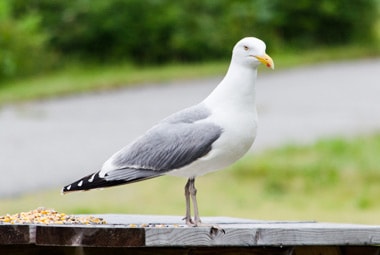
Gulls are type of scavenger that are found throughout the coastal and inland United States including Missouri. They are loud birds that have a distinctive “wail” or “squawk”.
| Pest Identification | |
|---|---|
| Recognition | The ring billed gull and herring gull are two of the most common species of gulls and have a similar appearance. Adults have grayish colored wings that have black tips, and a white head and body. They both range in length from 11-20 inches and adults weight between 1 to 2 pounds. The juveniles in both species have a more mottled brown coloring to their feathers. Some differences include that ring billed gulls have yellow legs, while the herring gull have pinkish colored legs; also the herring gull is a bit larger, have broader wings, and is more barrel chested. |
| Biology | Gulls are monogamous breeders and mate for life. They breed once a year and their mating season lasts for about 3-5 months. They nest and hatch their eggs together in large colonies and tend to return to the same breeding site year after year. |
| Habits | Gulls are typically associated with coastal areas, but many live their lives completely inland and never even see the ocean. Gulls are scavengers and typically live around people in order to gain easy access to food. They can be found in large numbers in places like golf courses, parking lots, airports fields, and near garbage dumps. Gulls can become problematic in public areas leaving large amount of feces, becoming a danger for airplanes that are taking off and landing, and aggressively “begging” for food. |
| Prevention | The best way to deter gulls from your property is to limit their food and water sources. It is important to make sure that garbage cans have tight fitting lids on them so that they cannot scavenge for food. It is also important to never ever start the habit of feeding any gulls that are on your property and deterring other people from doing so. Placing balloons or other moving objects near the places gulls like to rest can help to deter them and encourage them to choose a new location. |
| Professional | The best way to safely, legally and effectively control gulls on your property is through the help of a professional wildlife control expert. Gulls are federally protected under the Migratory Bird Treaty Act. The wildlife management experts at Rottler Pest & Lawn Solutions understand this regulation and how to successfully control gulls on your property within those guidelines. |

